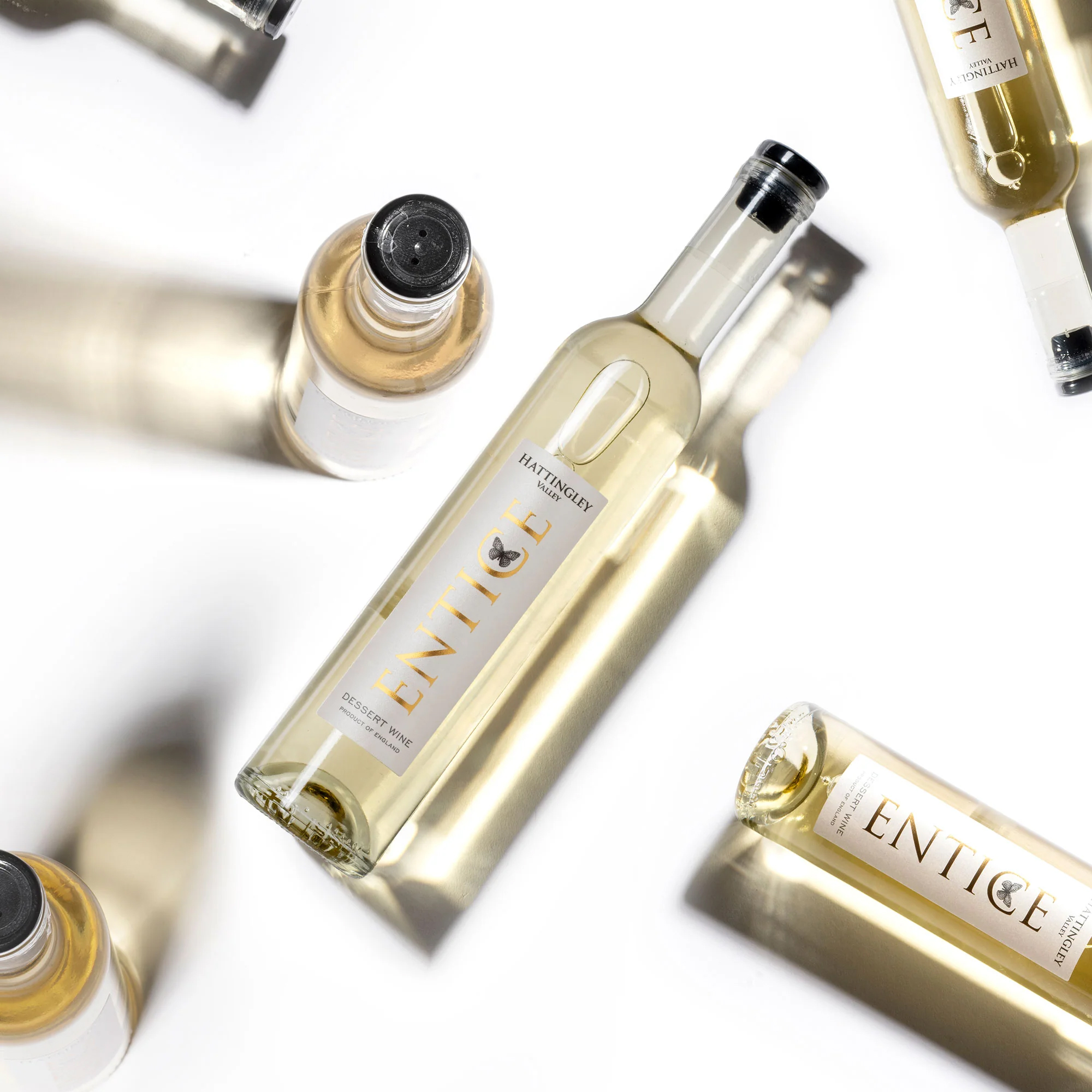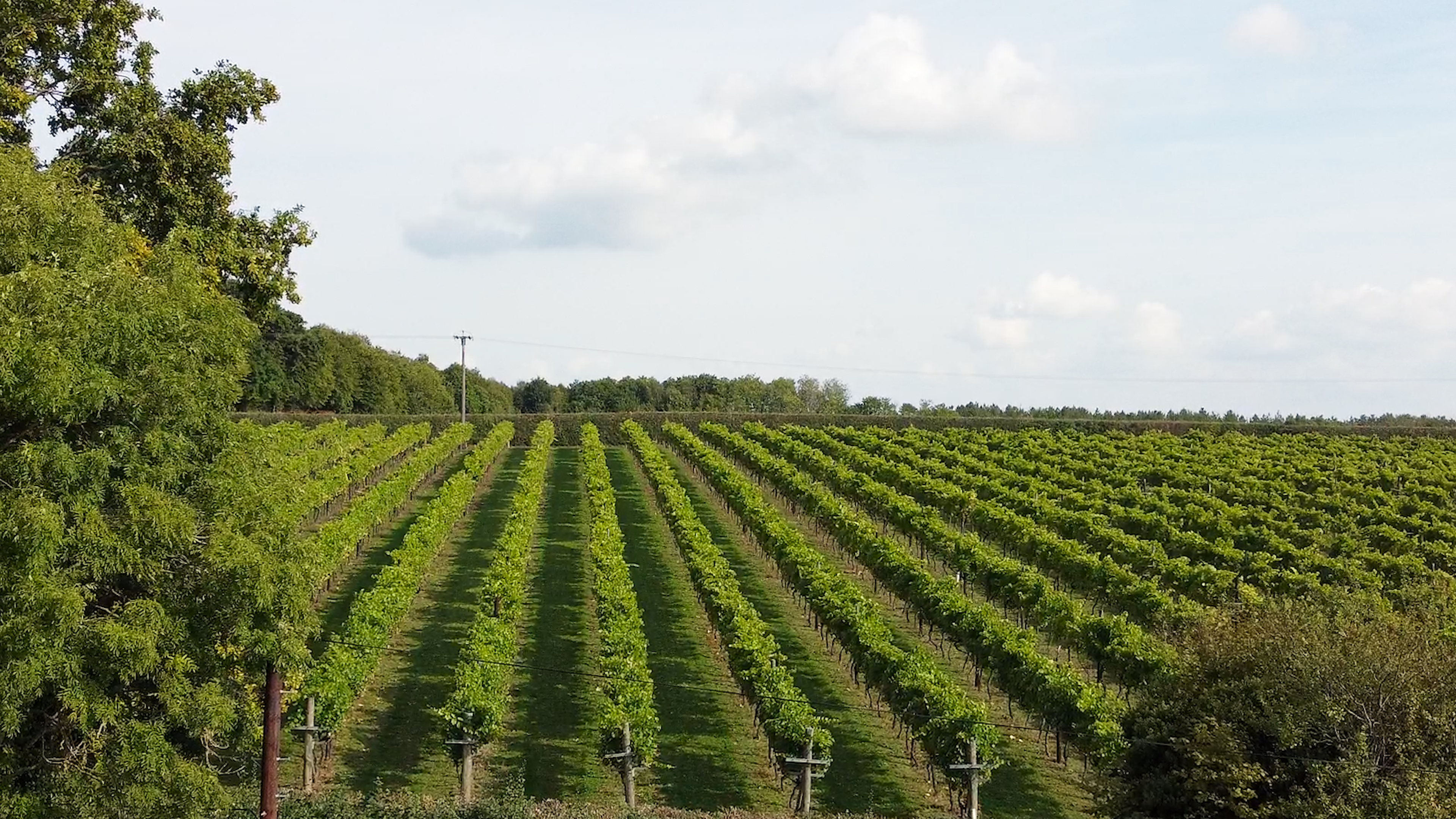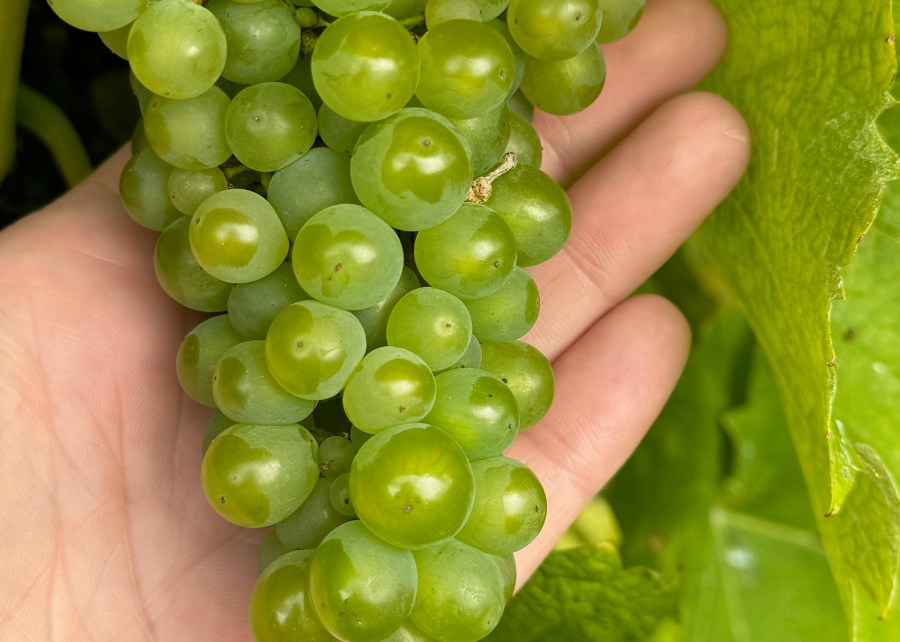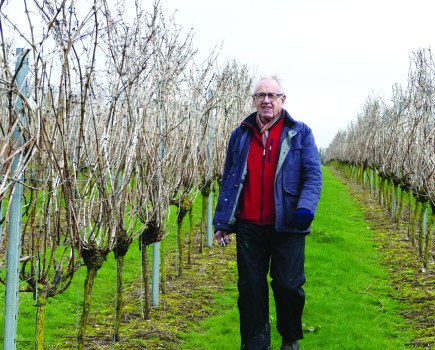Bacchus, named for the Roman god of wine and wine-making, is the fourth most planted grape variety in England and Wales.
Bacchus accounts for around 8% of plantings and is predominantly, but not exclusively, used to make still white wines.
Many draw a comparison with Sauvignon Blanc because of Bacchus’ crisp acidity and aromatic flavour profile. Wines can offer a complex spectrum of flavours. The standard array includes citrus tones, elderflower, green orchard flavours and a touch of spice. Some wines even feature juicier peach and passionfruit notes but still with a zesty, light finish.
Some commentators have gone so far as to call Bacchus the signature grape of the English wine industry; something that speaks uniquely of our land and our climate. So let’s take an in-depth look at this (still relatively young) grape variety.
History
The grape was first developed at the Geilweilerhof Institute for Vine Breeding in Siebeldingen, a town in western Germany. Its story began in 1933, when agronomists Peter Morio and Bernhard Husfeld, bred a complicated cross – mixing an existing Silvaner and Riesling cross with Müller-Thurgau.
Of course, those parents are themselves crosses – Silvaner coming from Traminer and Oesterreichish Weiss, and Müller-Thurgau arising from Riesling and Madeleine Royal. It’s perhaps fair to describe Bacchus then, as a mix of a number of aromatic varieties with a big hit of Riesling.
This long and complicated process of breeding desirable characteristics took a long time. In the early part of the 20th century, some hybrids had a poor reputation because the evaluation of their strengths and weaknesses was not complete and they were producing poor quality wine. Many countries forbade the use of hybrids and vine breeding programmes petered out, but in Germany fungal resistance breeding continued with government support.
When it was finally included in Germany’s permitted varieties and released as a general cultivar in 1972, Bacchus reached the attention of English winemakers because of its early ripening. Bacchus was hardy against disease and offered the promise of a higher yield for UK winegrowers than the classic historic grape varieties.
In Germany, Bacchus has not enjoyed any particular success. Its small number of plantings in 1985 had reduced by around 50% in 2016, blamed on lower acidity levels in the finished wines which did not meet with market preference at the time. In England, the cooler climate gave a long, cool growing season. This has resulted in Bacchus grapes with a slightly higher acidity and more prominent phenolics leading to more aromatic and interesting wines.
The breakthrough moment for Bacchus in the UK came with Winbirri Vineyard’s Bacchus 2015 winning Best White Single-Varietal Wine in the World at the 2017 Decanter World Wine Awards.
Winbirri Vineyards – Still Bacchus
Quite reasonably, Lee Dyer at Norfolk’s Winbirri Vineyards was first inspired to plant Bacchus by searching for the perfect match for the flavours he’d enjoyed on his own personal wine journey before he even began his career in the family business. Marlborough Sauvignon Blanc and Rioja style wines were particularly to his taste.
“My winemaking can reflect that preference quite closely,” Lee said. “We make our Bacchus a little bit more racier and a bit zingier than some of the softer forms you see out in the market.”
The Decanter win was a watershed moment for more than just Winbirri, in Lee’s opinion:
“It did us so much good, really put us on the map – and put our business into complete and utter meltdown overnight! But it put English white wine on the map globally. To be fair, it was the impact that England needed for our still wines. We’d already won the argument with sparkling. But prior to that date English still white wine was a hard sell.
“In 2016, I’m not going to lie to you, it was pretty difficult just to get people to try it, let alone to buy it. So after that award win it all changed. Obviously if one English producer can make an amazing Bacchus then someone’s down the road isn’t going to be horrendous, is it?”
Since 2017, Winbirri’s Bacchus (and other varietal wines) have been going from strength to strength. They had a bit of luck with their planning since they’d already increased their Bacchus plantings in 2016 before the win was announced, which added another 150% to their yield. Those vines are at full yield now, and Bacchus accounts for around 40% of Winbirri’s estate. But in the years while those new vines were getting established, Lee has focused on organically building capacity whilst retaining quality.
“It’s a great variety and we [English and Welsh winemakers] can do it amazingly well,” Lee said. “Every year I’m seeing more and more people who are trying to make Chardonnay the poster grape for English wine, but I feel it’s only in certain years you can make amazing Chardonnays in England. Bacchus is reliable, it’s right for our climate now. In the English wine industry we need good consistency.”
Consistency in sales is something that Winbirri Vineyards have enjoyed thanks to their award-winning Bacchus. After having to restrict sales in the immediate aftermath of the win to keep the stock available for longer, the 2022 vintage took just six months to sell out. The next year, it was only thanks to the unusually large harvest that the release didn’t sell out on advance sales alone.
The many faces of Bacchus
While the bulk of UK Bacchus winemaking focuses on still white wines, there is also a good deal of experimentation with styles taking place, which shows what flexibility and potential the variety offers, in the right hands.
Hattingley Valley Wines – “the first English style ice wine”
While Hampshire’s Hattingley Valley’s young vineyard was still establishing itself in 2011, assistant winemaker Jacob Leadley took a year out to train in New Zealand. The experience inspired him to embark on an unusual experiment with Bacchus – making an ice wine.
Since the UK climate is not cold enough to make ice wine in the traditional way, the fruit was harvested as normal and then placed in an industrial freezer. Hattingley’s Cocquard Champagne press was used to leverage sufficient pressure to press the frozen fruit. It can take anything from 36 to 72 hours, with the press having to be restarted every three hours. The winemaking team takes shifts sleeping on the tasting room sofa to make sure that the process is overseen throughout.
The pressing leaves a huge quantity of compressed frozen matter in the press which can take up to a fortnight to fully thaw. The team learned to leave this job until the very end of harvest to prevent delays elsewhere along the line. Afterwards, they set to work steaming and chipping away to attempt to speed up the great defrosting in the press.
Only a small batch was made in the first year, 2013, which wasn’t commercially viable. But off the back of that test run, the next year four tonnes of Bacchus was harvested specifically to make more. This is how Hattingley’s Entice Dessert Wine NV was born.
A blend of multiple vintages, Entice gives a rich sweetness balanced against crisp acidity that helps to accentuate the aromatic fruit flavours.

New Hall Wine Estate – Railway Barn Sparkling Bacchus
Essex’s New Hall Wine Estate may have been founded before Bacchus’ commercial release, but that hasn’t stopped them from embracing the potential of the variety.
They were still early adopters of the grape, as Estate Manager Andy Hares describes:
“We have over 10 hectares of Bacchus with planting dates ranging from 1976 to 2018, all grown in different styles, reflecting the ‘best practice’ at that time. Bacchus responds well to our microclimate here in East Anglia and particularly well in the Crouch Valley, with more Growing Degree Days than anywhere else in the country and low rainfall, we have conditions that Bacchus vines thrive on”.
The inspiration behind planting Bacchus came from Piers Greenwood, the second generation winemaker at New Hall who spent three years in Alsace undertaking an apprenticeship with the Hugel Brothers. They arranged a six week placement for him at the Geisenheim Grape Institution. He discovered Bacchus and realised the potential it had for success in Essex and also for the growth of the English still wine industry.
Now, the contemporary winemaking team have continued that spirit of experimentation by adding a sparkling Bacchus to their popular Railway Barn series of sparkling wines. Released in May 2025, the team feel that the wine is intended to be “a seriously appealing, inviting Charmat that our customers could enjoy throughout the year.” They emphasise that the flavour profile of Bacchus; the passionfruit, pear, lychee and subtle floral notes make it an ideal candidate for their playful style of sparkling wine.
Flint Vineyard – Bacchus Fumé
A number of wineries are making delicately oaked Bacchus wines to much acclaim, thanks to the additional complexity that is added by the maturation. Furleigh Estate and Hidden Spring make well respected examples.
At Flint Vineyards the grapes are sourced from across East Anglia, as well as from Flint’s own vineyards, to ensure maximum complexity. The parcels of fruit are fermented separately, with around 60% de-stemmed and crushed before pressing. The remaining 40% is whole bunch pressed to retain acidity.
Flint’s cool fermentation takes place in older, neutral barrels, concrete tanks and traditional oak foudres – all porous vessels that help bring on character and texture. Some of the wine is left on the lees in barrel and is aged for six months without malolactic fermentation.
This process gives a dry wine that is crisp and complex. It offers apple, pear and floral tones on the nose and a creamy mouthfeel with flavours of concentrated stone fruit complemented by a refreshing grapefruit note.
In 2023, Flint Vineyard decided to make the jump to only producing a Bacchus Fumé and no longer making the stainless steel Bacchus that they had created since 2016. Head Winemaker and co-founder Ben Witchell believes that the variety needs a little oxygen to really encourage the most character in the finished wine.
Litmus Wines – Orange Bacchus
Litmus Wines are made in Surrey by Australian-born winemaker John Worontschak. He has a contract winemaking business and also buys up quality fruit from around the UK to make wines of his own. Under the Litmus label, we find an Orange Bacchus, which is fermented and left on the skins for six weeks with sulphur dioxide.
The tasting notes say that Orange Bacchus offers hazelnut and marzipan on the nose, but the aroma is very light, as is the flavour and colour. The wine has an enjoyable peach character, with a dash of white pepper and a light tannin astringency.
The future of Bacchus
The Bacchus story is not necessarily one of complete positivity, however. Esteemed wine writer Fiona Beckett may have found plenty of English Bacchus to recommend to her readership, but does occasionally point out that she doesn’t particularly care for the variety personally.
“But I do think it’s much improved,” Fiona tells me. “However for me it’s still far from the most exciting thing that’s going on in English wine.”
A perfectly acceptable position, but perhaps not quite the ringing endorsement that winemakers are hoping for.
Matt Hodgson at Grape Britannia felt that some of the wines produced in the exceptionally high temperature summer of 2022 were “overripe and lacking in complexity and freshness” as he tasted his way around the 2023 releases.
It seems that climate change will eventually loom large over English and Welsh Bacchus, as it does over all of our plantings. For the time being over at Winbirri, Lee Dyer is not overly concerned for his Bacchus plantings.
“I think it’s still going to hold a place for a while. Other grapes will have their days numbered in the styles that they’re currently used for. For example, Solaris – which is a grape I work with quite heavily as well – is the very first grape we pick in our vineyards. So to keep the style the same as it is now, that’s going to be the first one that will suffer [from the effects of climate change.]
“I’ve probably got three or four grapes that we end up picking before the Bacchus, so I would say it’s got a little while yet – bearing in mind that I’m in Norfolk. For somewhere on the south coast that period of time may be a lot shorter. For us, Bacchus has still got a lot of time to play out and the general public love it. And I think we should be focusing on creating wines that the public want to buy.”
Meanwhile, in Kent, some producers are already starting to turn away from Bacchus. Having planted vines in 2007 and then adding more in 2018 because of demand, Tom Barnes at Biddenden Vineyards is now starting to grub some Bacchus up to replace them with other varieties that will suit their business better.
“We’re quite an early site,” Tom said. “So Riesling and Gewürztraminer suit us really well as we can let the fruit hang for longer and really get that phenolic ripeness.
“We’ve never had a problem growing Bacchus. It’s a very consistent grape variety and low maintenance for us. I just feel there’s more exciting things to be done in the UK and also everybody’s doing it. Everybody has Bacchus in one form or another. When you’re looking at how you’re going to keep your tourism and retail business consistent for another 20 or 30 years, you’ve got to have different offerings and you’ve got to continuously look for that next challenge.”
While Tom can easily grow Bacchus – and make commercially successful wines with it – he is reserved about taking the easy option of a reliable variety and ending up with more stock than is pragmatically needed.
“The industry as a whole doesn’t need a colossal amount of fruit that we have not got a market for at the moment,” Tom muses. “It needs interesting new things that keep people interested and talking about us, rather than all focusing on the same thing.”

Biddenden Vineyards is now starting to grub some Bacchus up to replace them with other varieties that will suit their business better




